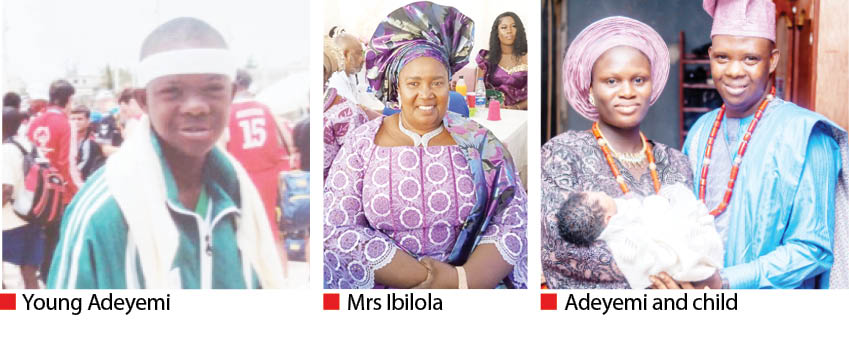Mrs Ibilola Abosede Oshin is the founder and Managing Director (MD) of Treasure Down Syndrome and Persons with Special Needs Foundation, Ibadan, Oyo State. She is the mother of 26-year-old Adeyemi Oshin, a Paralympic basketball champion. She speaks to Daily Trust Saturday on her challenges raising Adeyemi who has Down syndrome.
How soon did you realise the task ahead as regards the upbringing of your son?
I never knew what Down syndrome was all about. When he passed four months, I noticed that he could not hold his neck. Anytime he sat, he fell. I took him to the University College Hospital (UCH), Ibadan, and lo and behold, the medical practitioners did not know what the condition was. They said that they saw something different about him but that they didn’t really know what it was until when their consultants came and said that the boy was different because he was a boy living with Down syndrome. I fell on the ground, rolling and crying.
One of the consultants said, “It is not a death certificate.” He explained that the boy would be slow in doing things and all he needed to do he would do at the right time. To God be the glory, I summoned courage and was taking care of him because he was an only child. When he clocked a year and six months, he walked! That encouraged me and I started working more on him. Any little thing anybody asked me to do for him, I would do.
Getting the right education for a child with such a condition must have been tedious, how did you…?
When he was two, I put him in a school near my house. I told the proprietor that he was a special needs child and she told me not to worry; that we should bring him before he got enrolled in a special school. He grew up there, learnt to sing rhymes, and each morning when you see other people getting ready to go to school, he would be eager too. But when it got to a stage, I realised that he was not coping and I had to look for a special school for him. I took him to the Down Syndrome Foundation, Lagos, where he spent about three years. There, he was taught how to do sporting activities, and in 2010, he was opportune to win the Special Olympics and he went to represent Nigeria in Athens, Greece, and came back with a gold medal. That was the beginning of my success because I never felt anything good could come out of him. That encouraged me.
- Seminarian killed as gunmen set Catholic parish house ablaze in Kaduna
- Husband ‘kills’ wife over food in Edo
Along the line, I withdrew him from Lagos. I studied more on Down syndrome. I worked with a foundation like mine, caring for people with Down syndrome, and at the end of the day, I officially set up mine in 2015. I started taking care of children with Down syndrome and giving hope to parents who think they don’t have hope.
He plays basketball and even won a gold medal?
He plays basketball very well and has about six gold medals won by him. He also barbs very well, he dances too and he is also into shoe making.
How did you handle the feeling of hopelessness that comes with the upbringing of a child with special needs?
At a stage when he was still very young, I felt I should go and dump him somewhere so that somebody would pick him up and take care of him. I didn’t know I could get anywhere with him. But you see, God has been gracious and He granted me patience to deal with my situation. Raising these kinds of children requires a lot of patience. And I can say that his significant improvement encouraged me to press on so much that I had to go study about Down syndrome. He has been an inspiration.
Can you relate your journey into becoming a mother in-law?
Three years ago he met his heartthrob. I used to see them together, especially in the evenings. I felt it was normal for children to play together, but to God be the glory, a caregiver hinted that something was going on. I replied that it was nothing but a sister-brother relationship. She suggested that I watch closely. I started monitoring them and realised that the girl liked my son. So, I called her, saying, “Gbemi, do you know this boy? Do you know he is someone living with a disability?” She said, “Yes mummy, can’t you see that he’s very handsome and different from others?” I said that I didn’t want a situation where in the future people would think that I forced you to marry him. She said no, that she wanted to marry him, that she liked him. I asked if she was sure and she said yes. Then they started dating and I called my pastor and narrated everything. I called the girl’s mother and she said that she had been aware all along and had prayed about it and the Lord had given a go-ahead. So, we had a quiet church blessing and after a year and four months, she took in and delivered a very beautiful girl.
What has been your input to the growth and development of the couple; especially that the wife is not on the Down syndrome spectrum?
As a mother, I have always been guiding them. Yemi learnt barbing while Gbemi is a hairdresser. I look forward to opening a beautiful salon for People Living with Disabilities (PLWD) and people can come around and have their hair cut or made. Indeed, there is nothing which the Lord cannot do.
I often advise them to be steadfast in the Lord and love each other and never allow a third party; myself included, to interfere in their affairs. I do encourage them to sort out their misunderstanding and let no one come in between them, and this has been working for them.
What do you say to mothers going through similar experiences?
I often discuss and relate with parents who have children living with certain conditions as a co-parent and not as the director of the care home. I often share my challenges from the onset and relay how I have overcome them. With patience, parents would achieve much.

 Join Daily Trust WhatsApp Community For Quick Access To News and Happenings Around You.
Join Daily Trust WhatsApp Community For Quick Access To News and Happenings Around You.
